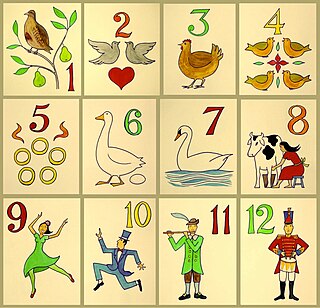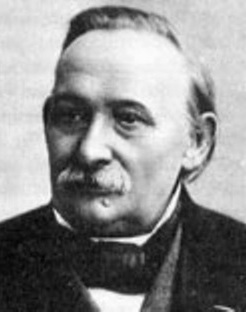Related Research Articles

A refrain is the line or lines that are repeated in music or in poetry — the "chorus" of a song. Poetic fixed forms that feature refrains include the villanelle, the virelay, and the sestina.

A cumulative song is a song with a simple verse structure modified by progressive addition so that each verse is longer than the verse before. Cumulative songs are popular for group singing, in part because they require relatively little memorization of lyrics, and because remembering the previous verse to concatenate it to form the current verse can become a kind of game.
"Poor Poor Pitiful Me" is a rock song written and first recorded by American musician Warren Zevon in 1976.
"Nowhere Man" is a song by the English rock band the Beatles. It was released in December 1965 on their album Rubber Soul, except in the United States and Canada, where it was first issued as a single A-side in February 1966 before appearing on the album Yesterday and Today. The song was written by John Lennon and credited to the Lennon–McCartney partnership. In the U.S., the single peaked at number 3 on the Billboard Hot 100 and number 1 on the chart compiled by Record World magazine, as it did the RPM 100 chart in Canada and in Australia. The song was also released as a single in some countries where it had been included on Rubber Soul, including Australia, where it topped the singles chart.

Chorus is the fifth studio album by English synth-pop duo Erasure, released on 14 October 1991 by Mute Records in Germany and the UK and on 15 October 1991 by Sire/Reprise Records in the United States. In 1999, Ned Raggett ranked the album at number 45 in his list of "The Top 136 or So Albums of the Nineties".
"Iko Iko" is a much-covered New Orleans song that tells of a parade collision between two tribes of Mardi Gras Indians and the traditional confrontation. The song, under the original title "Jock-A-Mo", was written and released in 1953 as a single by James "Sugar Boy" Crawford and his Cane Cutters but it failed to make the charts.

"Man on the Moon" is a song by American alternative rock band R.E.M., released in November 1992 as the second single from their eighth album, Automatic for the People (1992). The lyrics were written by lead singer Michael Stipe, and the music by drummer Bill Berry and guitarist Peter Buck. The song was well received by critics and reached number 30 on the US Billboard Hot 100, number 17 on the US Cash Box Top 100, number 18 on the UK Singles Chart, and number one in Iceland. It remains one of R.E.M.'s most popular songs and was included on the compilations In Time: The Best of R.E.M. 1988–2003 and Part Lies, Part Heart, Part Truth, Part Garbage 1982–2011.

"Down by the River" is a song composed by Neil Young. It was first released on his 1969 album with Crazy Horse, Everybody Knows This Is Nowhere. Young explained the context of the story in the liner notes of his 1977 anthology album Decade, stating that he wrote "Down by the River," "Cinnamon Girl" and "Cowgirl in the Sand" while delirious in bed in Topanga Canyon with a 103 °F (39 °C) fever.
"The Unquiet Grave" is an English folk song in which a young man's grief over the death of his true love is so deep that it disturbs her eternal sleep. It was collected in 1868 by Francis James Child as Child Ballad number 78. One of the more common tunes used for the ballad is the same as that used for the English ballad "Dives and Lazarus" and the Irish pub favorite "Star of the County Down".

"The Night the Lights Went Out in Georgia" is a Southern Gothic murder ballad, written in 1972 by songwriter Bobby Russell and first recorded by his then-wife singer, comedian, and actress Vicki Lawrence. Lawrence's version, from her 1973 album of the same name, went to number one on the US Billboard Hot 100 chart after its release. Of several cover versions, the one recorded by Reba McEntire for her 1991 album For My Broken Heart peaked at number 12 on the Hot Country Songs chart.

"Old Dan Tucker," also known as "Ole Dan Tucker," "Dan Tucker," and other variants, is an American popular song. Its origins remain obscure; the tune may have come from oral tradition, and the words may have been written by songwriter and performer Dan Emmett. The blackface troupe the Virginia Minstrels popularized "Old Dan Tucker" in 1843, and it quickly became a minstrel hit, behind only "Miss Lucy Long" and "Mary Blane" in popularity during the antebellum period. "Old Dan Tucker" entered the folk vernacular around the same time. Today it is a bluegrass and country music standard. It is no. 390 in the Roud Folk Song Index.

"The Raggle Taggle Gypsy" (Roud 1, Child 200), is a traditional folk song that originated as a Scottish border ballad, and has been popular throughout Britain, Ireland and North America. It concerns a rich lady who runs off to join the gypsies (or one gypsy). Common alternative names are "Gypsy Davy", "The Raggle Taggle Gypsies O", "The Gypsy Laddie(s)", "Black Jack David" (or "Davy") and "Seven Yellow Gypsies".

"Kisses Sweeter Than Wine" is a popular song, with lyrics written and music adapted in 1950 by Pete Seeger and Lee Hays of The Weavers, and recorded by Jimmie Rodgers. The tune was adapted from Lead Belly's "If It Wasn't for Dicky" (1937), which in turn was adapted from the traditional Irish folk tune "Drimindown / Drumion Dubh". The Weavers first released the song in 1951 as a Decca single, which reached number 19 on the Billboard chart and number 20 on the Cashbox chart in 1951.
"Man of Constant Sorrow" is a traditional American folk song first published by Dick Burnett, a partially blind fiddler from Kentucky. The song was originally titled "Farewell Song" in a songbook by Burnett dated to around 1913. A version recorded by Emry Arthur in 1928 gave the song its current titles.
"The Faithful Hussar" is a German song based on a folk song known in various versions since the 19th century. In its current standard form, it is a song from the Cologne Carnival since the 1920s.

"A Country Boy Can Survive" is a song written and recorded by American musician Hank Williams Jr. The song was released as a single in January 1982 and reached a peak of number 2 on the Billboard Hot Country Singles chart in March 1982. It is considered one of Williams' signature songs even though it never reached number one.

"Simple Life" is a song written by English musician Elton John and songwriter Bernie Taupin, released in 1993 by Rocket and MCA as the final single from John's twenty-third studio album, The One (1992). The song was John's thirteenth number one on the US Billboard Adult Contemporary chart, spending three weeks at the number-one spot, and reached number thirty on the Billboard Hot 100. It also peaked at number three on Canada's RPM Top Singles chart and topped the RPM Adult Contemporary chart for three weeks. This song's appearance in the US top 40 set a record, as John had achieved a top-forty hit for 24 consecutive years, breaking the old record of 23 years set by Elvis Presley in 1977.
Volkslied is a genre of popular songs in German which are traditionally sung. While many of them were first passed orally, several collections were published from the late 18th century. Later, some popular songs were also included in this classification.

Franz Theodor Magnus Böhme was a German academic, musicologist, composer, folksong collector and writer on music history and folksong.

"Der Ritter und die Magd" is a traditional German folk song. With a few changes, it was included by Clemens Brentano and Achim von Arnim in their collection of German folk songs and poems, Des Knaben Wunderhorn. As its possible source, both editors used a German broadside printed before 1790. Another version of the song, published in Die deutschen Volkslieder mit ihren Singweisen (1843) was recorded from an oral source near Cottbus.
References
- ↑ Erk, Ludwig; Irmer, Wilhelm, eds. (1838). "No. 22: Musikantenlied". Die deutschen Volkslieder mit ihren Singweisen (in German). Vol. 2. Berlin: Plahn'sche Buchhandlung (Louis Nitze). pp. 18–19.
- ↑ "Packham, Harold". Catalog of Copyright Entries Third Series: Published Music: January–June 1951. Vol. 5, Part 5A, Number 1. Washington D. C.: Copyright Office. 1951. p. 167.
- 1 2 "Billy Cotton - The Music Man / Bless 'Em All - Decca". 78 RPM. Retrieved 2024-03-19.
- ↑ "The Radio Revellers - The Music Man / Sweet Violets - Columbia". 78 RPM. Retrieved 2024-03-19.
- 1 2 Ireson, Barbara; Rowe, Christopher, eds. (1978). "The Music Man". Over and Over Again. London: Beaver Books. pp. 100–101, 219.
- ↑ "BLACK LACE | Full Official Chart History". officialcharts.com . Archived from the original on 23 April 2023. Retrieved 2023-05-11.
- ↑ "George Rasely And Mardi Bryant - Sing-Along - The Children's Record Guild". 78 RPM. Retrieved 2024-03-19.
- ↑ Waldron, Vince (2011). "Nuts". The Official Dick Van Dyke Show Book (Revised and Updated ed.). Chicago Review Press. ISBN 9781569768396.
- ↑ Grayson, Marion, ed. (1962). "I Am a Fine Musician". Let's Do Fingerplays. Washington: Robert B. Luce. p. 87.
- ↑ Miller, Henry (1964). "The Unilateral, Multilingual, Sesquipedalian Activity". Henry Miller on Writing. New York: New Directions Book. p. 127.
- ↑ Die schönsten Lieder 2 (in German). Berlin: KDM Verlag. 1995. pp. 52–53.
- ↑ Kennedy, Peter, ed. (1975). "201: The German Musicianer". Folksongs of Britain and Ireland. London: Cassell. p. 478.
- ↑ Potter, Debra (1990). I Am The Music Man. United Kingdom: Peter Haddock Publishing. ISBN 0-710-51376-3.